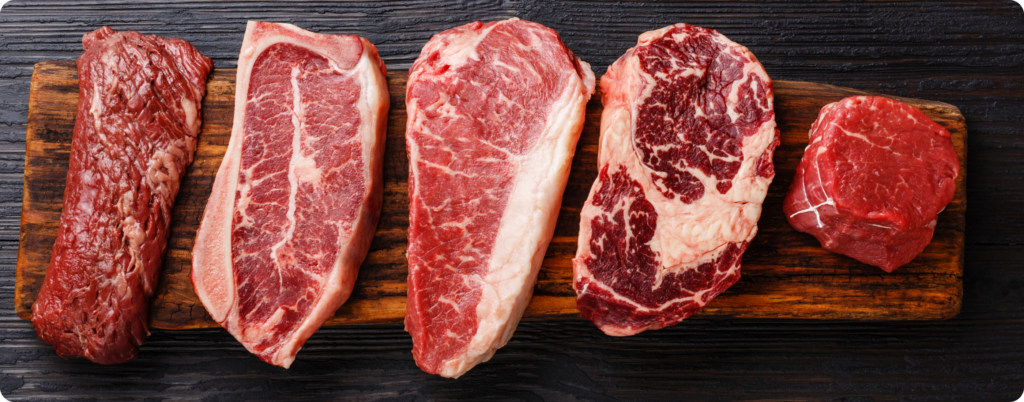PLEASE NOTE: The information in this blog is for educational purposes only. It is not a substitute for professional medical advice. Consult your healthcare provider if you’re seeking medical advice, diagnoses, or treatment.
Few diseases strike fear in the hearts and minds of people quite like cancer does.
Considering cancer is responsible for over 8 million deaths per year, this fear has unfortunately become a reality for far too many people (1). Not to mention, the number of new cancer cases is estimated to bloom by 70% over the next twenty years.

With the focus on cancer prevention being so prevalent, certain foods and lifestyle habits take the blame. One of the main whipping boys for increased cancer risk is red meat.
Even after millions of years of red meat consumption, it’s now being blamed as a key contributor to total mortality, diabetes, obesity, cardiovascular disease, and multiple types of cancer (2).
How could this be? As we’ll see, the connection between red meat and cancer is more complicated than it appears.
Humans Evolved Eating Red Meat
The human body is no stranger to red meat from lamb, beef, wild game, and pork. Humans (and our ancestors) have feasted on meat for millions of years (3, 4).

Unsurprisingly, we now know that red meat is one of the most nutrient-dense components of the human diet and has several powerful upsides:
- Red meat is a rich source of protein and fat (5)
- Red meat offers highly bioavailable B vitamins along with selenium, iron, and zinc (6)
- Red meat contains all eight essential amino acids for adults and nine for children (7)
- Meat is a source of omega-3 polyunsaturated fatty acids (8)
The consumption of cooked red meat is thought to play a part in the evolutionary separation of primates and humans (9). It’s also believed to have helped shape cognitive development and the human digestive tract (10, 11, 12).
So how does something that humans have cherished for millions of years end up being listed as a probable carcinogen and a factor in the development of so many chronic diseases?
Let’s find out.
How The WHO Classified Red Meat as A Probable Carcinogen
The idea that red meat has the potential to cause cancer comes in large part from the World Health Organization (WHO).

The WHO’s International Agency for Research on Cancer (IARC) assembled a team of 22 self-nominated members in 2015 to explore the connection between red or processed meat and cancer (13).
Using animal experiments, mechanistic studies, and observational studies, the working group examined over 800 pieces of evidence. Of these studies, seven out of fourteen total found an increased risk of colorectal cancer for those eating the most meat. Twelve of eighteen studies found for processed meat came to a similar conclusion.
When looking at meat intake and other types of cancer, the working group came to no conclusion due to limited data.
Even with data that was conflicting or missing entirely, the IARC determined that the relative risk of colon cancer increased by 18% for each 50 grams of processed meat consumption compared to those eating less processed meat (14).
The IARC then went on to classify red meat as probably carcinogenic and processed meat as carcinogenic (15).
However, due to various issues with epidemiological studies and other evidence used by this working group, these findings are less cut and dry than they seem.
The Problem With Epidemiological Studies
Despite the thousands of studies claiming a connection between red meat intake and cancer, these claims are often based on weak data, impacted by unmeasurable factors, and not backed by stronger research such as randomized controlled trials (16).
If you take a look at cancer research related to red meat, you’ll often find conclusions like:
“Red meat consumption was associated with increased risk of overall cancer mortality, non-Hodgkin lymphoma (NHL), bladder, breast, colorectal, endometrial, esophageal, gastric, lung and nasopharyngeal cancer.” (17)
“Our results indicated that red meat consumption was associated with higher risks of CVD, CHD, and stroke mortality, and the associations were not modified by lifestyle and genetic risk factors.” (18)
“we found that a greater consumption of unprocessed and processed red meat is associated with a higher mortality risk.” (19)
While these conclusions can seem frightening, epidemiological studies are mainly able to find correlation, not causation. As we know, correlation does not equal causation.
Epidemiological studies are also prone to other key issues that can cast doubt on the findings.

One of the main issues is the use of questionnaires to determine someone’s dietary intake. Participants may have difficulty accurately recalling past exposures or habits, leading to recall bias or massive errors in nutrient intake (20, 21). People also tend to conceal habits they are ashamed of (22).
The classification of red meat is something else to pay close attention to. When most people think of red meat, you likely think of steak, burger patties, wild game, or lamb. Yet, some studies categorize pizza and lasagna as red meat (23). Comparing a grass-fed steak to a pizza with meat is misleading.
Many epidemiological studies examining red meat and cancer have trouble generalizing their findings to other populations.
For example, a study on primarily white male and female health professionals cautioned that “because our participants were predominantly non-Hispanic white health professionals, the generalizability of the observed associations may be limited to similar populations.” (24).
Observational studies cannot control for all variables (such as socioeconomic status or smoking habits), which leads to uncertainty regarding the cause of observed results.
Red Meat and Cancer: What’s the Connection?
As we can see, there’s a wide variety of issues with many of the claims that red meat contributes to breast cancer, colorectal cancer, and other common cancers.
Studies done on humans frequently show no cause-and-effect relationship between red meat and negative health outcomes (25). Some of the highest-quality scientific evidence comes from randomized controlled trials (RCTs), yet there are no long-term RCTs exploring different disease outcomes and meat consumption (26). Due to the cost, time restraints, and other logistical challenges, it’s unlikely that one will be undertaken (27).

Meat does not appear to increase the risk of disease as part of a healthy diet, and updated research is beginning to remove the negative stigma surrounding red meat (28, 29).
Even though many of the claims of red meat and chronic disease may not be what they seem, meat can run into issues based on how it’s cooked, prepared, or produced.
Some carcinogens, such as HCAs and PAHs, can develop from prolonged exposure to high heat (as found in grilling or barbecuing)(30, 31). Processed or smoked meats such as bacon, cured meats, and sausages may contain N-nitroso compounds (NOCs) which are potentially carcinogenic (32).
So, these challenges may be avoided by avoiding highly processed meats, not charring or over cooking meat, and sourcing meat from trusted locations (33).
The Otherside of Red Meat and Cancer
Animal protein is an amazing source of bioavailable nutrients treasured for millions of years. If you’re a meat eater, you’ve likely still seen or heard snarky comments about your meat intake, leading to heart disease, cancer, diabetes, and many other major challenges.
While these ideas tend to linger, it’s not always that simple of a conclusion. The modern individual has to contend with attacks on their health from seemingly all angles. Food, water, modern stressors, technology, and other everyday lifestyle habits may contribute to any number of chronic diseases.
Cancer, in particular, is highly complex. Even with the mountain of evidence against red meat (and other animal foods), the results are generally inconclusive or unable to determine a true cause.
Heart Health Stack
Nature's Formula for Cardiovascular Strength
Subscribe to future articles like this:
